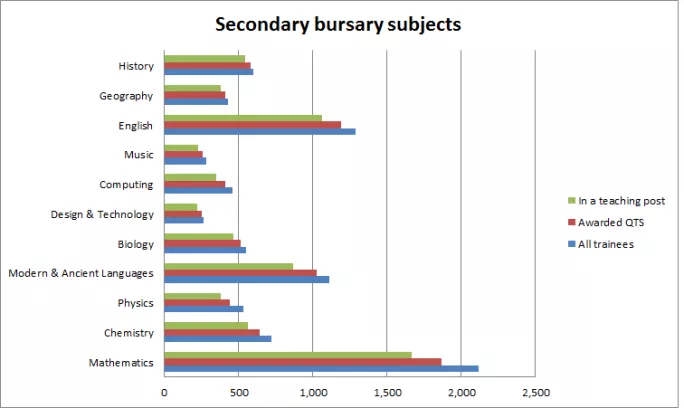More than one in four would-be physics teachers dropped out of their course or could not find jobs last year - despite receiving scholarships or bursaries of up to £25,000, new statistics reveal.
Of the 536 trainees eligible for bursaries who began postgraduate teacher training in 2014, 441 were awarded qualified teacher status (QTS) and 380 were in a teaching post six months after completing their training, according to Department for Education data, published today.
This means that 29 per cent of those who started training with physics bursaries were not working in the classroom six months after they were expected to have finished their course.
In total 3,197 (19 per cent) of the 17,006 trainees who were eligible for a bursary in 2014-15, in both secondary subjects and primary, were not in a teaching post six months later.
The data shows that 1,462 of these trainees did not gain QTS. Of the remaining 1,735 trainees who were not in a teaching post, just 330 said they were looking for a job as a teacher.
Physics was one of four bursary subjects in which more than one in 10 trainees did not gain QTS, with 18 per cent dropping out during training. 12 per cent of trainee maths teachers and 11 per cent of chemistry and computing trainees also did not complete the course.
The news comes as UCAS published its monthly update on recruitment to teacher training in 2016 showing there were more applications for physics training places by July this year than at the same time last year.
This year, there have been 3,020 applications for physics so far, compared to 2,290 applications in July 2015. Applicants can make up to three applications.
But with two months to go until courses start, the overall number of applicants for teacher training in 2016 stood at 43,260, which is 270 fewer than in 2015.
Final year postgraduate trainee award status and employment outcomes for trainees who were eligible for bursaries. Source: DfE
DfE must show value for money
The release of the statistics comes after the DfE was criticised for spending almost £1 billion on bursaries over seven years without knowing whether they were effective.
The National Audit Office has said that the DfE must do more to show how the money it is spending is improving the recruitment and retention of teachers.
The highest bursaries available in 2014-15 were £20,000. For graduates entering teaching this year, the highest bursary is £30,000 - which is available to physics graduates with a first-class degree or PhD.
The DfE said that 95 per cent of those trainees who were eligible for bursaries and gained QTS found jobs within six months.
Schools minister Nick Gibb said: “Great teachers change lives by instilling a passion for education, and giving children the best start in life.
“Today’s statistics show the government’s approach to teacher training is working, with a higher rate of trainees achieving qualified teacher status than in the last 10 years.
“The figures also show a rising percentage of new teachers finding a teaching post within 6 months of qualifying. We have given schools more involvement in teacher training which means headteachers can be sure their new teachers have the knowledge and skills that are needed to be successful in the classroom.”
Want to keep up with the latest education news and opinion? Follow TES on Twitter and like TES on Facebook





